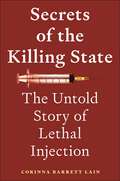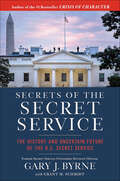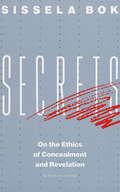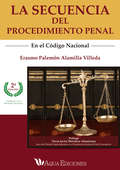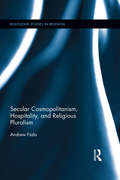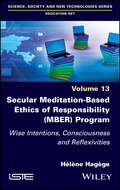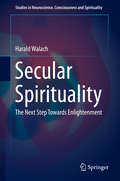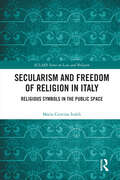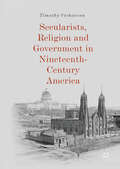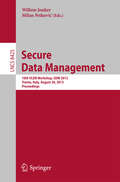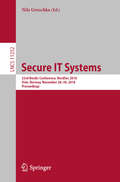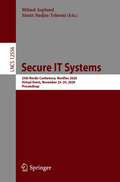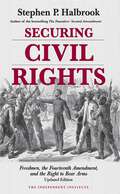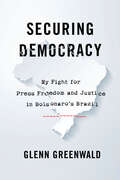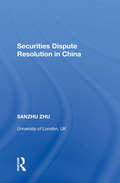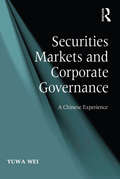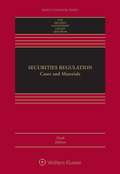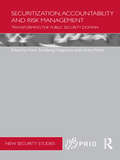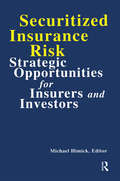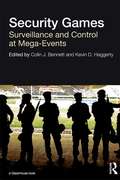- Table View
- List View
Secrets and Laws
by Melanie L WilliamsThis book demonstrates that law can be newly interrogated when examined through the lens of literature. The book creates simple pathways which energise and illustrate the links between legal theory and legal science and doctrine through the wider visions of history, literature and culture. This broadening approach is integral to understanding law in the context of wider debates and media in the community. The book provides a collection of essays, with additional commentary which reflects upon very recent scholarship and debate on a range of ethico-legal topics; it also illustrates how conventional legal matters may be rendered lively and palatable, as an adjunct to approaching doctrine and cases 'cold' in the conventional textbook manner. The chapters range from examination of current thought on cohabitation and marriage laws (via Jude the Obscure), 19th century medico-legal cases relevant to current narratives of insanity in women and the nature and status of expert evidence generally; assisted suicide and autonomy (via a poem by Jon Stallworthy) to an essay on the nature of race and ethnicity (via a poem by R S Thomas), a discussion of obscenity and moral philosophy (via an essay on Crash by J G Ballard and the philosophy of Bernard Williams) and a history of ideas discussion of positivism, natural law and political crisis, war and terrorism through legal and political theory texts and a poem by Auden. The materials refer to case law where appropriate.
Secrets of the Killing State: The Untold Story of Lethal Injection
by Corinna Barrett LainLethal injection is nothing like what people think. This is its untold story.In the popular imagination, lethal injection is a slight pinch and a swift nodding off to forever-sleep. It is performed by well-qualified medical professionals. It is regulated and carefully conducted. And it usually provides a “humane” death. In reality, however, not one of those things is true.Secrets of the Killing State pulls back the curtain on this clandestine punishment practice, presenting a view of lethal injection that states have worked hard to hide. Botched executions are a part of this story, but they are just the tip of the iceberg. For all the suffering that we see, there is also suffering that we don’t see. Indeed, the story told here is even bigger than the executions themselves, for behind the scenes is where it unfolds. Fake science, torturous drugs, inept executioners, prison problems, and decades of state secrecy have created an execution method hard-wired to go wrong in countless ways.The story of lethal injection is a story of gross incompetence, law breaking, torturous deaths, and a stunning indifference to the way in which human beings die at the hands of the state. These are the secrets of the killing state—all that we know from litigation files, scientific studies, investigative journalism, autopsy reports, interviews, and scholarship across a number of fields. Death penalty expert Corinna Barrett Lain uses this groundbreaking journey into the dark reality of lethal injection to shine a light on the American death penalty more broadly and show that the state at its most powerful moment is also the state at its worst.We are now over 45 years into the lethal injection era, and most Americans still have no idea what states are doing in their name. It’s time they found out.
Secrets of the Secret Service: The History and Uncertain Future of the U.S. Secret Service (Pocket Inspirations)
by Gary J. Byrne Grant M. SchmidtFrom the author of the #1 New York Times bestseller CRISIS OF CHARACTER comes an explosive new exposé of the Secret Service.The United States Secret Service is tasked with protecting our Presidents, their families, and the complex in which they live and work. Given this important mission, world stability rests upon the shoulders of its agents. In his new book, former Secret Service officer Gary Byrne takes readers behind the scenes to understand the agency's history and today's security failings that he believes put Americans at risk The American public knows the stories of Secret Service heroism, but they don't know about the hidden legacy of problems that have plagued the agency ever since its creation.Gary Byrne says that decades of catastrophic public failures, near misses, and bureaucratic and cultural rot threaten to erode this critical organization from the inside out.Today, as it works to protect President Trump, the Secret Service stands at a crossroads, and the time needed to choose the right course is running out. Agents and officers are leaving the Secret Service in droves, or they're being overworked to the point where they lose focus on the job. Management makes decisions based on politics, not the welfare of their employees. Byrne believes that this means danger for the men and women of the Secret Service, danger for the President they protect, and danger for the nation. In this book, he shares what he has witnessed and learned about the Secret Service with the hope that the problems of this most important agency can be fixed before it's too late.
Secrets: On the Ethics of Concealment and Revelation
by Sissela BokThe author of Lying shows how the ethical issues raised by secrets and secrecy in our careers or private lives take us to the heart of the critical questions of private and public morality.
Secuencia del procedimiento penal
by Erasmo Palemón AlamillaLa obra que tiene en sus manos, constituye un texto de consulta diaria que no habrá solamente de ser minuciosamente leído en su totalidad; por el contrario, debe ser considerado una herramienta diaria de consulta, a la que debe acudirse en cada caso particular para disipar dudas, aclarar ideas y recordar conceptos que habremos de utilizar en cada una de las audiencias que tienen lugar durante la tramitación de un proceso acusatorio, pues el esquema adoptado por el autor para su elaboración, permite que este texto de consulta cotidiana nos permita salir avante en las diversas problemáticas jurídicas a las que defensores, fiscales, asesores jurídicos y juzgadores nos enfrentamos cada día. Cabe agregar que esta segunda edición, aborda ya la más reciente reforma al Código Nacional de Procedimientos Penales publicada en el Diario Oficial de la Federación el pasado 17 de junio, lo que le otorga un valor adicional al ya enriquecido texto, que seguro estoy constituirá un bastión en las bibliotecas personales de todos aquellos que en modo alguno estamos involucrados con el nuevo sistema de justicia penal, lo que me permite considerar que el éxito de esta obra no sólo está asegurado, sino que será cada vez mayor.
Secular Cosmopolitanism, Hospitality, and Religious Pluralism (Routledge Studies in Religion)
by Andrew FialaThis book explores the idea of religious pluralism while defending the norms of secular cosmopolitanism, which include liberty, tolerance, civility, and hospitality. The secular cosmopolitan ideal requires us to be more tolerant and more hospitable toward religious believers and non-believers from diverse traditions in our religiously pluralistic world. Some have argued that the world’s religions can be united around a common core. This book argues that it is both impossible and inadvisable either to reduce religion to one thing or to deny religion. Instead, the book affirms non reductive pluralism and seeks to understand how we should live in a pluralistic world. Building on work in the sociology of religion and philosophy of religion, the book examines the grown of religious diversity (and the spread of nonreligion) in the contemporary world. It argues that religious toleration, hospitality, and compassion must be extended in a global direction. Secular cosmopolitanism recognizes that each person has a right to his or her deepest beliefs and that the diversity of the world’s religious and non-religious traditions cannot be reduced or eliminated.
Secular Meditation-Based Ethics of Responsibility (MBER) Program: Wise Intentions, Consciousness and Reflexivities
by Helene HagègeSecular Spirituality
by Harald WalachThis book discusses spirituality as an emerging scientific topic from a historical perspective, with extensive discussion of the mind-body problem and of scientific concepts of consciousness. While the book focuses on the Western tradition of 'Enlightenment', it also implicitly addresses the double meaning of the term, with the Eastern tradition describing it as 'a state of true knowledge, which is an important goal on an individual's spiritual path' and the Western tradition seeing it as 'the collective process of getting rid of narrow-minded dogmas and concepts'. The book is based on a simple yet challenging premise: Science has not gone far enough in the scientific process of going from a collective mind tied up in dogmatic teachings to a truly free mind that, seemingly, freed itself from bondage and restrictions. The book shows that science, and with it our whole Western culture, has to incorporate spirituality if it is to realize this goal of enlightenment. If that is done, and it can only be done by many individuals actually practicing spirituality, this will also lead to the individual type of enlightenment.
Secularism and Freedom of Religion in Italy: Religious Symbols in the Public Space (ICLARS Series on Law and Religion)
by Maria Cristina IvaldiThe display of religious symbols in the public space has been the subject of much debate. This book provides an overview of the presence of religious symbols in Italian public institutions from a legal standpoint.The situation is analysed from the perspective of the principles of laicità/secularism, as defined by the Constitutional Court, and freedom of religion. It is argued that while the display of religious symbols in public institutions has been widely investigated doctrinally, the wearing of religious symbols in Italy has generally been neglected. Key cases are examined in light of national jurisprudence as well as intervention by the European Court of Human Rights and relevant judgments from foreign courts regarding this issue. Finally, the work considers the presence of religious symbols that transcend national borders, as in the case of arts, sport and advertising. A comparison is made with the French system which takes a very different approach. The book outlines possible ways forward in light of the growing interculturality of European societies.It will be a valuable resource for academics, researchers and policy-makers working in the areas of law and religion, and comparative law.
Secularism: Law, Policy, and Religious Diversity (Boundaries of Religious Freedom: Regulating Religion in Diverse Societies)
by David KoussensThe increasing visibility of Islam in France and the vehemence of debates about it have often contributed to narrow public perceptions of secularism to a simplistic antireligious crusade, a misleading image disseminated by the media and politicians alike. Taking the opposite stand, this book embarks on a comprehensive effort to document the multiple areas in which French secularism plays out - in debates over “cults,” places of worship, chaplaincy services in public institutions, the recognition of associations of worship, and more -, outlining and analizing the legal paths favored by the state in the regulation of religious diversity. While Islam has undoubtedly contributed to the reshaping of French secularism in the last decades, the book moves beyond what has come to be known as the "Muslim Question" to look at the multiplicity of challenges contemporary religious beliefs, practices, and organizations now pose to the state. David Koussens examines the main political and legal configurations of French secularism over the last thirty years through a sociological and juridical lens, in order to better document its diversity. Such a portrait emphasizes that French secularism is not a univocal phenomenon but one that appears in many guises.
Secularists, Religion and Government in Nineteenth-Century America
by Timothy VerhoevenThis book shows how, through a series of fierce battles over Sabbath laws, legislative chaplains, Bible-reading in public schools and other flashpoints, nineteenth-century secularists mounted a powerful case for a separation of religion and government. Among their diverse ranks were religious skeptics, liberal Protestants, members of minority faiths, labor reformers and defenders of slavery. Drawing on popular petitions to Congress, a neglected historical source, the book explores how this secularist mobilization gathered energy at the grassroots level. The nineteenth century is usually seen as the golden age of an informal Protestant establishment. Timothy Verhoeven demonstrates that, far from being crushed by an evangelical juggernaut, secularists harnessed a range of cultural forces—the legacy of the Revolutionary founders, hostility to Catholicism, a belief in national exceptionalism and more—to argue that the United States was not a Christian nation, branding their opponents as fanatics who threatened both democratic liberties as well as true religion.
Secure Data Management
by Willem Jonker Milan PetkovićThis book constitutes the refereed proceedings of the 10th VLDB Workshop on Secure Data Management held in Trento, Italy, on August 30, 2013. The 15 revised full papers and one keynote paper presented were carefully reviewed and selected from various submissions. The papers are organized in technical papers and 10 vision papers which address key challenges in secure data management and indicate interesting research questions.
Secure IT Systems: 23rd Nordic Conference, NordSec 2018, Oslo, Norway, November 28-30, 2018, Proceedings (Lecture Notes in Computer Science #11252)
by Nils GruschkaThis book constitutes the refereed proceedings on the 23rd Nordic Conference on Secure IT Systems, NordSec 2018, held in Oslo, Norway, in November 2018.The 29 full papers presented in this volume were carefully reviewed and selected from 81 submissions. They are organized in topical sections named: privacy; cryptography; network and cloud security; cyber security and malware; and security for software and software development.
Secure IT Systems: 25th Nordic Conference, NordSec 2020, Virtual Event, November 23–24, 2020, Proceedings (Lecture Notes in Computer Science #12556)
by Simin Nadjm-Tehrani Mikael AsplundThis book constitutes the refereed proceedings of the 25th Nordic Conference on Secure IT Systems, NordSec 2020, which was organized by Linköping University, Sweden, and held online during November 23-24, 2020.The 15 papers presented in this volume were carefully reviewed and selected from 45 submissions. They were organized in topical sections named: malware and attacks; formal analysis; applied cryptography; security mechanisms and training; and applications and privacy.
Securing Approval: Domestic Politics and Multilateral Authorization for War
by Terrence L. ChapmanAmong the most momentous decisions that leaders of a state are called upon to make is whether or not to initiate warfare. How their military will fare against the opponent may be the first consideration, but not far behind are concerns about domestic political response and the reaction of the international community. Securing Approval makes clear the relationship between these two seemingly distinct concerns, demonstrating how multilateral security organizations like the UN influence foreign policy through public opinion without ever exercising direct enforcement power. While UN approval of a proposed action often bolsters public support, its refusal of endorsement may conversely send a strong signal to domestic audiences that the action will be exceedingly costly or overly aggressive. With a cogent theoretical and empirical argument, Terrence L. Chapman provides new evidence for how multilateral organizations matter in security affairs as well as a new way of thinking about the design and function of these institutions.
Securing Civil Rights: Freedmen, the Fourteenth Amendment, and the Right to Bear Arms
by Stephen P. HalbrookStephen Halbrook's groundbreaking study of freed slaves and the right to bear arms in the aftermath of the Civil War, cited in Supreme Court cases, now with a new foreword by Robert J. Cottrol.What did it mean to take civil rights seriously—especially the &“right to bear arms&”—in the years following the abolition of slavery? By quoting legislative debates, Congressional hearings on Ku Klux Klan violence, and newspapers and law books of the time, constitutional scholar Stephen Halbrook shows that both supporters and opponents of the Fourteenth Amendment (1868) believed that it protected all Bill of Rights guarantees—especially the Second Amendment—from infringement by the states. From the Freedmen&’s Bureau Act of 1866 to the Supreme Court&’s decision in United States v. Cruikshank (1876), Halbrook paints a vivid portrait of a political and legal system grappling with the true meaning of civil rights. &“Trusting ex-slaves to own firearms was, by any definition, the cutting edge in true belief in civil rights,&” Halbrook writes. &“It remains to be seen whether contemporary society will accommodate the same rights of the freedmen that the Framers of the Fourteenth Amendment sought to guarantee.&” Although Halbrook concentrates on the right to keep and bear arms, he also includes a comprehensive analysis of the general topic of the relationship between the Bill of Rights and the state governments after the ratification of the Fourteenth Amendment. Cited by both the U.S. Supreme Court in its historic landmark decision in the McDonald case (2010) and the Washington Supreme Court in State of Washington v. Christopher William Sieyes case (2010) as the leading account of the relationship between the Second Amendment and the states during Reconstruction, Halbrook&’s insightful narrative will help a larger audience better understand why earlier generations of Americans viewed the right to bear arms as essential for securing civil rights.
Securing Democracy: My Fight for Press Freedom and Justice in Brazil
by Glenn GreenwaldIn this riveting follow-up to his acclaimed international bestseller No Place to Hide, Glenn Greenwald documents the courageous fight for press freedom in Brazil, where authoritarianism and rampant corruption threaten the most fundamental principles of democracy.In 2019, award-winning journalist Glenn Greenwald writes in his gripping new book, “a series of events commenced that once again placed me at the heart of a sustained and explosive journalistic controversy.” New reporting by Greenwald and a team of Brazilian journalists had brought to light stunning information about grave corruption, deceit, and wrongdoing by the most powerful political actors in Brazil, his home since 2005. These stories, based on a massive trove of previously undisclosed telephone calls, audio, and text shared by an anonymous source, came to light only months after the January 2019 inauguration of Brazil’s far-right president, Jair Bolsonaro, an ally of U.S. President Donald Trump.The revelations “had an explosive impact on Brazilian politics” (Guardian) and prompted serious rancor, including direct attacks by President Bolsonaro himself, and ultimately an attempt by the government to criminally prosecute Greenwald for his reporting. “A wave of death threats — in a country where political violence is commonplace — have poured in, preventing me from ever leaving my house for any reason without armed guards and an armored vehicle,” Greenwald writes.Securing Democracy takes readers on a gripping journey through Brazilian politics as Greenwald, his husband, the left-wing congressman David Miranda, and a powerful opposition movement courageously challenge political corruption, homophobia, and tyranny. Most vitally, Greenwald demonstrates the importance of independent journalism in holding governments to account, reversing injustices, and ultimately securing the freedoms of democracy.
Securing Privacy in the Internet Age
by Anupam ChanderThe Internet Age has created vast and ubiquitous databases of personal information in universities, corporations, government agencies, and doctors' offices. Every week, stories of databases being compromised appear in the news. Yet, despite the fact that lost laptops and insecure computer servers jeopardize our privacy, privacy and security are typically considered in isolation. Advocates of privacy have sought to protect individuals from snooping corporations, while advocates of security have sought to protect corporations from snooping individuals. Securing Privacy in the Internet Age aims to merge the discussion of these two goals. The book brings together many of the world's leading academics, litigators, and public policy advocates to work towards enhancing privacy and security. While the traditional adversary of privacy advocates has been the government, in what they see as the role of the Orwellian Big Brother, the principal focus of this book is the fraternity of Little Brothers—the corporations and individuals who seek to profit from gathering personal information about others.
Securing Rights for Victims
by Robert C. Davis Julie Whitman James M. Anderson Susan HowleyThis book discusses how some clinics have won significant gains at the appellate and federal court levels concerning victim standing, the rights to be consulted and heard, and the right to privacy. Some have won significant victories in gaining standing for victims and expanding the definition of particular rights. Others are enjoined in the battle. But all have raised awareness of victims' rights in the justice system.
Securities Dispute Resolution in China
by Sanzhu ZhuSecurities Dispute Resolution in China is a comprehensive and detailed study of the increasingly important issue of how cases involving securities are dealt with by Chinese courts, commissions and other administrative authorities and by arbitration and mediation in the PRC. The work identifies the nature and types of securities disputes and the various procedures, including alternative dispute resolution, used to address them. This timely, groundbreaking book is particularly relevant at a time of growing foreign investment in China's securities market. The volume will be an invaluable resource for researchers and practitioners in developed as well as emerging markets.
Securities Markets and Corporate Governance: A Chinese Experience
by Yuwa WeiThis book explores the rationalities and functions of securities markets and takeover activities. Focusing on the Chinese experience of utilizing the securities market as an effective mechanism of corporate control, this volume analyses the future development of China's financial market in the era of economic globalization. Providing an overview of the historical development of the securities market and a literature review of the economic functions of stock markets, Securities Markets and Corporate Governance also examines the legal regimes governing securities markets and takeovers in some leading corporate economies including the US, Germany, Japan and the UK. This volume then focuses on the Chinese experience, proposing a model which balances internal corporate governance and external market control for China.
Securities Regulation: Cases and Materials (Aspen Casebook Series)
by James D. Cox Robert W. Hillman Donald C. Langevoort Ann M. Lipton William K. SjostromThis book contains a very teachable mix of problems, cases, and textual material, encouraging students to build their knowledge base by being active problem-solvers. Always forward-thinking, stressing current developments and controversies, the book is also highly modular, so that professors can easily pick and choose how to structure their courses without being locked into any given progression. New to the Ninth Edition: Coverage of “cryptocurrencies” and coin offerings, Commentary on market developments such as indexing and algorithmic trading, A tighter set of problems and materials on gun-jumping under Section 5, The SEC’s latest reforms of Regulation D and the intrastate offering exemption, Spotify and the trend toward direct listings as a way of going public, Coverage of Supreme Court decisions from the last three years, including Lorenzo, Salman, Cyan, Lucia, and Kokesh, as well as important lower court cases, The SEC broker-dealer proposal (and perhaps adoption) of Regulation Best Interest. Professors and students will benefit from: The book’s highly modular organization, enabling different teaching formats and coverage, Concise notes that introduce the reader to both theory and real-life practice issues. "Securities Regulation casebook for law students"- Provided by publisher.
Securitization, Accountability and Risk Management: Transforming the Public Security Domain (PRIO New Security Studies)
by Ulrika Mörth Karin Svedberg HelgessonThis edited volume examines the reconstitution of the public security domain since the 9/11 attacks, focusing on the banking sector and anti-money laundering (AML) activity in particular. Since the inception of the ‘Financial Action Taskforce’ (FATF) in 1989, AML has been viewed as a global problem. This text argues that the securitization of the financial sector as a result of AML has entailed the emergence of a new public security domain, which transcends the classic public-private divide. The analysis in the volume is multidisciplinary and combines concepts and theories from the literature on securitization, the public-private divide, and business/management. The authors argue that the state is under transformation and that the developments in the security field are part of an ongoing renegotiation of the relationship between the state and the business sector. Securitization, Accountability and Risk Management therefore contributes to a deeper understanding of how the power relationships have changed between the public and the private sectors after 9/11. This interdisciplinary book will be of much interest to students of critical security, risk management, business studies, critical legal studies and IR in general.
Securitized Insurance Risk: Strategic Opportunities for Insurers and Investors (Glenlake Business Monographs)
by Michael HimickSecuritized Insurance Risk is one of the first books to focus exclusively on the convergence of the insurance and financial markets in risk management and the emergence of insurance risk as a non-correlated asset class. Written for insurers and investors alike, this book explores the opportunities available to forward-looking risk and investment managers. Chapters by prominent experts specifically address: the win-win principle behind securitizing insurance risk; current structures, including catastrophe bonds, structured notes, catastrophe options, and swaps; partnering financial market tools with traditional reinsurance programs; holding insurance risk, uncorrelated with stocks and bonds; pricing insurance risk instruments and evaluating basic risk; and regulatory and accounting concerns.
Security Games: Surveillance and Control at Mega-Events
by Kevin D. Haggerty Colin J. BennettSecurity Games: Surveillance and Control at Mega-Events addresses the impact of mega-events – such as the Olympic Games and the World Cup – on wider practices of security and surveillance. "Mega-Events" pose peculiar and extensive security challenges. The overwhelming imperative is that "nothing should go wrong." There are, however, an almost infinite number of things that can "go wrong"; producing the perceived need for pre-emptive risk assessments, and an expanding range of security measures, including extensive forms and levels of surveillance. These measures are delivered by a "security/industrial complex" consisting of powerful transnational corporate, governmental and military actors, eager to showcase the latest technologies and prove that they can deliver "spectacular levels of security". Mega-events have thus become occasions for experiments in monitoring people and places. And, as such, they have become important moments in the development and dispersal of surveillance, as the infrastructure established for mega-events are often marketed as security solutions for the more routine monitoring of people and place. Mega-events, then, now serve as focal points for the proliferation of security and surveillance. They are microcosms of larger trends and processes, through which – as the contributors to this volume demonstrate – we can observe the complex ways that security and surveillance are now implicated in unique confluences of technology, institutional motivations, and public-private security arrangements. As the exceptional conditions of the mega-event become the norm, Security Games: Surveillance and Control at Mega-Events therefore provides the glimpse of a possible future that is more intensively and extensively monitored.

